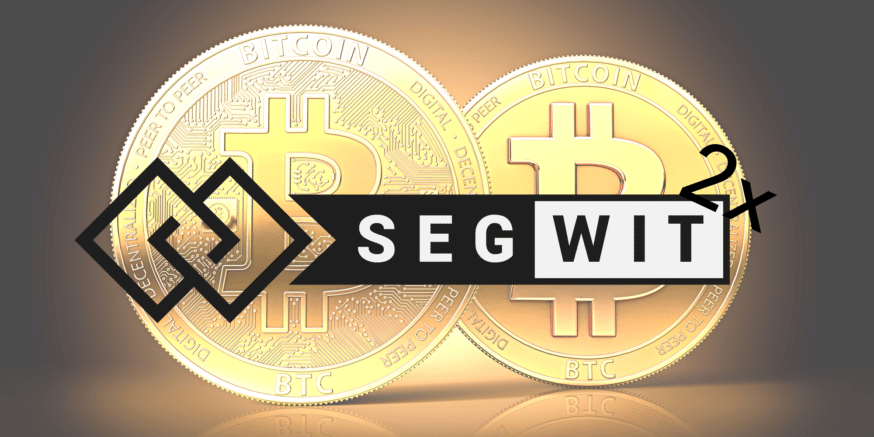The origins of Segwit2x go back many years now, as the Bitcoin community has long debated how to scale Bitcoin to meet the increasing volume of transactions on the network.
One camp, primarily comprised of the big miners, has argued for increasing the size of the blocks in the Bitcoin blockchain from 1 MB to a much larger size. Blocks are mined every ten minutes and contain all the recent transactions.
With a bigger block size, more transactions can be included in a single block. Doing this would require a “hard fork”, a backwards incompatible protocol change, which would result in splitting the chain into two coins.
Editor’s note: This article was originally published on October 17th, 2017 prior to the Segwit2x outcome. SegWit2x was never implemented due to a lack of consensus in the Bitcoin community. Updated 2023.
The other camp has argued that since this idea does not have widespread consensus, contentiously splitting the chain would not be safe and presented a serious moral hazard. Increasing the block size too large centralizes the network and makes it impossible for most users to run their own nodes.
To answer scaling, this camp developed a “soft fork”, a voluntary and backwards compatible protocol upgrade, titled “Segregated Witness” or “Segwit”. Segwit introduced a major bug fix for transaction malleability and unlocked a variety of new features. Notably, a new transaction type which used much less data so more transactions could fit in a single 1 MB block. This effectively turned a 1 MB block into a block theoretically as large as 4 MB. In addition, Segwit better paved the way for the upcoming “Lightning Network”, which creates ultra cheap and instant payments on the Bitcoin network.
Segwit was deployed on the network set to activate once 95% of mining hashpower signaled it was ready. Despite Segwit being entirely voluntary and opt-in, this readiness signal was provided by developers as a courtesy so all miners would be ready to process the new transactions and would not inadvertently miss out on any mining revenue.
Since the big block camp was primarily comprised of the largest mining pools, they instead used this readiness signal as a veto and therefore blocked the activation of Segwit as they argued for their solution instead.
This left the Bitcoin community at an impasse for some time as the debate raged on. Solutions for a hard fork to a bigger block size were presented but never received significant consensus outside of the miners who developed them and their supporters.
Finally in May 2017, the lead miners met with a group of big Bitcoin businesses in a private meeting and crafted the “New York Agreement” to activate what they called “Segwit2x”. Their idea was that with a majority of miners and enough large businesses in support of this proposal that the rest of the community would fall in line with them and this new chain would be “Bitcoin” without contention.
Segwit2x called for the activation of Segwit in August to be followed up by a hardfork to a 2 MB base block size. Since Segwit was an effective block size increase itself, this was essentially increasing the block size to 8 MB. The top developers from the open source Bitcoin development process known as “Bitcoin Core” warned that Segwit2x presented a variety of grave risks to the network. Namely, the increase in the centralization of miners and depraving users of the ability to run their own full nodes. In addition, they warned a rushed hard fork like this violated the most minimal of responsible engineering practices. Citing the lack of significant specification and time for testing, as well as the introduction of new attack vectors.
So while Segwit did activate on August 1, 2017, the community remains in debate as the hard fork to the larger block size on approximately November 18th grows closers. Even though a number of miners and business have backed out of the agreement, Segwit2x advocates argue that because they still have a majority of miners supporting this proposal that they have consensus to move forward. Since the governance model of Bitcoin does not function in this manner, there remains significant opposition to this hard fork. Should it occur, there will be split in the chain at block height 494,784 and a new coin will be created.
“What do I need to do?”
If you hold Bitcoin at the point of the hardfork, you will have coins on both chains. You are advised to hold your Bitcoin in a hardware wallet or any wallet where you hold your private keys and you will be able to split your coins like in the recent “Bitcoin Cash” hard fork. The largest exchanges, notably “Bitfinex” has stated that they will list the new Segwit2x coin as “B2X”. Many other popular exchanges and services , such as LocalBitcoins, that were not party to the agreement have indicated they will either not support Segwit2x at all or list it as an altcoin.
Segwit2x has been developed under the false premise that it will be the only chain and be known as Bitcoin. Therefore, it lacks sensible replay-protection seen in previous hard-forks that have intentionally created altcoins.
Despite pleas from the most notable Bitcoin Core developers to include replay-protection, and protect users from having their transactions unwillingly broadcasted on both chains, the Segwit2x camp has refused in an attempt to force people to follow them. The result is many simple wallets, known as “SPV” wallets and very commonly found on your phone, will be very confused as to which chain is Bitcoin.
It is recommended you do not keep your bitcoin on “breadwallet” or any other wallet that has not made it explicitly clear how it will handle the fork. It will not be safe to do any transactions for some time after the hard-fork occurs, so you should not attempt any until it’s widely reported from reputable sources that it is safe again.
Final Thoughts
While on the surface this debate can be viewed as how to scale Bitcoin, the underlying motivations of Segwit2x are much different.
Even signers of the agreement admit it is a concerted effort to get rid of the current decentralized development process in Bitcoin. Greater than that, it is an attempt by a small collection of individuals of power to change the governance model of Bitcoin and let big businesses and miners control the protocol instead of the users. Unfortunately for them, futures markets are valuing the new Segwit2x coin at very little compared to the traditional Bitcoin. At the time of this writing, it sits at 0.145 BTC but has recently fallen as low as 0.105 BTC.
While most miners may presently be signaling their intention to support Segwit2x, they ultimately cannot afford to do anything but follow what is the most profitable coin. While most of the community hopes the hard fork will be called off before November 18th, it is unlikely the new chain receives much support for too long regardless.
Bitcoin is valuable because it is the largest decentralized financial network that has ever existed. It is a bootstrapped peer-to-peer electronic cash system with no trusted third parties, where users always have the ability to verify the network and their money for themselves. While many may view Bitcoin’s inability to make big changes amidst a community in fierce debate and disagreement as a bug, it is a feature that this system cannot be changed without widespread consensus, and your money always sits solely in your control.
Never Miss Another Opportunity! Get hand selected news & info from our Crypto Experts so you can make educated, informed decisions that directly affect your crypto profits. Subscribe to CoinCentral free newsletter now.











